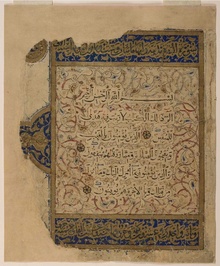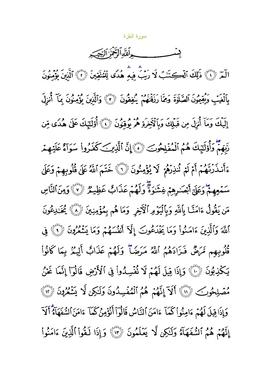Al-Baqara: Difference between revisions
(edited with ProveIt) |
|||
| Line 29: | Line 29: | ||
==Background== |
==Background== |
||
It is the longest surah of Quran by 286 verses. This Medinan sura was not revealed at once to prophet, but the various Islamic social circumstances and conditions is discussed among verses. <ref>{{cite web | url=http://www.al-islam.org/enlightening-commentary-light-holy-quran-vol-1/surah-al-baqarah-chapter-2-introduction | title=Surah Al-Baqarah, Chapter 2, Introduction | publisher=Al-islam | accessdate=14 May 2015 | |
It is the longest surah of Quran by 286 verses. This Medinan sura was not revealed at once to prophet, but the various Islamic social circumstances and conditions is discussed among verses. <ref>{{cite web | url=http://www.al-islam.org/enlightening-commentary-light-holy-quran-vol-1/surah-al-baqarah-chapter-2-introduction | title=Surah Al-Baqarah, Chapter 2, Introduction | publisher=Al-islam | accessdate=14 May 2015 | Author=Sadr-'ameli Sayyid Abbas}}</ref> The verse 281 was revealed during the The Farewell Pilgrimage in Mecca.<ref name=ayoub/>Mahmoud Ayoub, ''The Qurʾan and its interpreters'', pg. 55. [[Albany, New York|Albany]]: [[State University of New York Press]], 1984. ISBN 9780791495469</ref> It is also considered to be one of the first chapters revealed after the [[Hijra (Islam)|Hijra]] from [[Mecca]] to [[Medina]].<ref name=Meta/>Felicitas Meta Maria Opwis, ''Maṣlaḥah and the Purpose of the Law: Islamic Discourse on Legal Change from the 4th/10th to 8th/14th Century'', pg. 296. Volume 31 of Studies in Islamic Law and Society. [[Leiden]]: [[Brill Publishers]], 2010. ISBN 9789004184169</ref> |
||
==Theme and subject matter== |
==Theme and subject matter== |
||
The sura addresses a wide variety of topics, including substantial amounts of [[Sharia|law]], and retells stories of [[Adam (Bible)|Adam]], [[Abraham]] and [[Moses]]. A major theme is guidance: urging the [[Paganism|pagans]] ([[Mushrikeen|Al-Mushrikeen]]) and the [[Jew]]s of [[Medina]] to embrace [[Islam]], and warning them and the [[Munafiq|hypocrites]] of the fate God had visited in the past on those who failed to heed His call.{{Citation needed|date=July 2013}} Many of the stories in this chapter are shared to help people understand theological truth.<ref>R. G. Ghattas and Carol B. Ghattas, ''A Christian Guide to the Qur'an: Building Bridges in Muslim Evangelism'', pg. 40. Kregel Academic, 2009. ISBN 9780825493423</ref> Condemnation of [[alcoholic beverage]]s and [[gambling]] is also first found in the chapter,<ref>Kathryn Kueny, ''The Rhetoric of Sobriety: Wine in Early Islam'', pg. 66. Albany: State University of New York Press, 2001. ISBN 9780791450536</ref> and it is one of only four chapters in the Qur'an to refer to [[Christian]]s as [[Nazarene (title)|Nazarenes]] instead of the more frequent terms [[People of the Book]] or "Helpers of Christ."<ref>Karen Steenbrink, "Muslims and the Christian Other: Nasara in Qur'anic Readings." Taken from ''Mission is a Must: Intercultural Theology and the Mission of the Church'', pg. 200. Eds. Frans Jozef Servaas Wijsen and Peter J. A. Nissen. Volume 40 of Church and Theology in Context Series. [[Amsterdam]]: [[Rodopi (publisher)|Rodopi]], 2002. ISBN 9789042010819</ref> |
The sura addresses a wide variety of topics, including substantial amounts of [[Sharia|law]], and retells stories of [[Adam (Bible)|Adam]], [[Abraham]] and [[Moses]]. A major theme is guidance: urging the [[Paganism|pagans]] ([[Mushrikeen|Al-Mushrikeen]]) and the [[Jew]]s of [[Medina]] to embrace [[Islam]], and warning them and the [[Munafiq|hypocrites]] of the fate God had visited in the past on those who failed to heed His call.{{Citation needed|date=July 2013}} Many of the stories in this chapter are shared to help people understand theological truth.<ref>R. G. Ghattas and Carol B. Ghattas, ''A Christian Guide to the Qur'an: Building Bridges in Muslim Evangelism'', pg. 40. Kregel Academic, 2009. ISBN 9780825493423</ref> Condemnation of [[alcoholic beverage]]s and [[gambling]] is also first found in the chapter,<ref>Kathryn Kueny, ''The Rhetoric of Sobriety: Wine in Early Islam'', pg. 66. Albany: State University of New York Press, 2001. ISBN 9780791450536</ref> and it is one of only four chapters in the Qur'an to refer to [[Christian]]s as [[Nazarene (title)|Nazarenes]] instead of the more frequent terms [[People of the Book]] or "Helpers of Christ."<ref>Karen Steenbrink, "Muslims and the Christian Other: Nasara in Qur'anic Readings." Taken from ''Mission is a Must: Intercultural Theology and the Mission of the Church'', pg. 200. Eds. Frans Jozef Servaas Wijsen and Peter J. A. Nissen. Volume 40 of Church and Theology in Context Series. [[Amsterdam]]: [[Rodopi (publisher)|Rodopi]], 2002. ISBN 9789042010819</ref> |
||
Revision as of 07:57, 14 May 2015
| البقرة Al-Baqarah The Heifer | |
|---|---|
| Classification | Meccan |
| Position | Juzʼ 1–3 |
| No. of verses | 286 |
| No. of Rukus | 40 |
| Quran |
|---|

Surat al-Baqarah (Template:Lang-ar, Sūratu l-Baqarah, "The Cow") is the second and longest chapter of the Qur'an.[1] It is a Medinan sura, with the exception of verse 281 which was revealed during the The Farewell Pilgrimage.[2] It is also considered to be one of the first chapters revealed after the Hijra from Mecca to Medina.[3] The chapter comprises 286 verses according to the division of Ali, the most widely accepted count among all Muslim denominations,[2] and includes the single longest verse in the Qur'an (2:282).[4] The sura's name references verses 66–72 which recall the story of a heifer sacrificed by the Israelites.[2] The verse 281 was revealed during the The Farewell Pilgrimage in Mecca
Other notable passages include the famous āyat al-kursī or "Throne Verse", as well as the closing two verses which outline the six articles of belief before forming a prayer for forgiveness, divine mercy, and help against the enemies of faith.[5]
Sura al-Baqara enjoins fasting on the believer during the month of Ramadan.[6]
Name
The surah's name is in reference to the procrastinating of sacrificing a cow by the Israelites after the order of Allah (God). Thereafter, in order to know the murderer of a slain man, the flesh of the cow was used to hit the body that turned the man alive again, so he addressed the murderer. (see [Quran 2:67]). (Not to be confused with the popular biblical incident where Moses prohibited worshiping a Calf idol, referenced elsewhere in the chapter [Quran 2:51].)
Background
It is the longest surah of Quran by 286 verses. This Medinan sura was not revealed at once to prophet, but the various Islamic social circumstances and conditions is discussed among verses. [7] The verse 281 was revealed during the The Farewell Pilgrimage in Mecca.[2]Mahmoud Ayoub, The Qurʾan and its interpreters, pg. 55. Albany: State University of New York Press, 1984. ISBN 9780791495469</ref> It is also considered to be one of the first chapters revealed after the Hijra from Mecca to Medina.[8]Felicitas Meta Maria Opwis, Maṣlaḥah and the Purpose of the Law: Islamic Discourse on Legal Change from the 4th/10th to 8th/14th Century, pg. 296. Volume 31 of Studies in Islamic Law and Society. Leiden: Brill Publishers, 2010. ISBN 9789004184169</ref>
Theme and subject matter
The sura addresses a wide variety of topics, including substantial amounts of law, and retells stories of Adam, Abraham and Moses. A major theme is guidance: urging the pagans (Al-Mushrikeen) and the Jews of Medina to embrace Islam, and warning them and the hypocrites of the fate God had visited in the past on those who failed to heed His call.[citation needed] Many of the stories in this chapter are shared to help people understand theological truth.[9] Condemnation of alcoholic beverages and gambling is also first found in the chapter,[10] and it is one of only four chapters in the Qur'an to refer to Christians as Nazarenes instead of the more frequent terms People of the Book or "Helpers of Christ."[11]
Al-Baqarah contains several verses dealing with the subject of warfare. Verses [Quran 2:190] are often quoted on the nature of battle in Islam.[who?] This chapter also consists of five stories regarding Allah giving life to the dead, one story of Allah giving life to a dead animal (donkey) and one story regarding giving life to a bird.[citation needed]
As a part of Lutheran efforts at translating the Qur'an in the 17th century, itinerant German orientalist Christian Ravis translated al-Baqara along with Al-Fatiha and published bilingual versions in Amsterdam in 1646.[12]
Notable verses

Verse 216 is notable as ordaining Jihad.
Verse 255 is "The Throne Verse" (آية الكرسي ʾāyatu-l-kursī) It is the most famous verse of the Qur'an[citation needed] and is widely memorized and displayed in the Islamic world due to its emphatic description of God's omnipotence.
Verse 256 is one of the most quoted verses in the Qur'an. It famously notes that "there is no compulsion in religion."
There's also the last two ayahs (285 & 286).
Related ahadith
- Also see: Ayatul Kursi, Al-Falaq, Al-Nas
An authentic Hadith, or statement of the Muslim prophet Muhammad, reports that first-generation Muslim Ubay ibn Ka'b was asked about the greatest verse in the Qur'an, to which he answered, "Allah and His Messenger know better." When Muhammad repeated his question several times, Ubay said, "Ayatul Kursi." Muhammad commented, "Congratulations for having knowledge, O Abu Al-Mundhir! By He in Whose Hand is my soul! This verse has a tongue and two lips with which she praises the King (Allah) next to the leg of the Throne.[13]
Another authentic Hadith reports that Muhammed said: “Whoever recites Ayatul Kursi immediately after each prescribed prayer, there will be nothing standing between him and his entering heaven except death.”[14]
See also
References
- ^ Salwa M. S. El - Awa, Introduction to Textual Relations in Qur'an, pg. 1. Part of the Routledge Studies in the Qur'an series. London: Routledge, 2005. ISBN 9781134227471
- ^ a b c d Mahmoud Ayoub, The Qurʾan and its interpreters, pg. 55. Albany: State University of New York Press, 1984. ISBN 9780791495469
- ^ Felicitas Meta Maria Opwis, Maṣlaḥah and the Purpose of the Law: Islamic Discourse on Legal Change from the 4th/10th to 8th/14th Century, pg. 296. Volume 31 of Studies in Islamic Law and Society. Leiden: Brill Publishers, 2010. ISBN 9789004184169
- ^ "Physical Aspects of the Noble Qur'an". www.al-islam.org. Retrieved 2008-05-10.
- ^ The last two verses of Surah al Baqarah
- ^ Michael Binyon, Fighting is 'allowed' during the holy month of fasting The Times, 18 December 1998
- ^ "Surah Al-Baqarah, Chapter 2, Introduction". Al-islam. Retrieved 14 May 2015.
{{cite web}}: Unknown parameter|Author=ignored (|author=suggested) (help) - ^ Cite error: The named reference
Metawas invoked but never defined (see the help page). - ^ R. G. Ghattas and Carol B. Ghattas, A Christian Guide to the Qur'an: Building Bridges in Muslim Evangelism, pg. 40. Kregel Academic, 2009. ISBN 9780825493423
- ^ Kathryn Kueny, The Rhetoric of Sobriety: Wine in Early Islam, pg. 66. Albany: State University of New York Press, 2001. ISBN 9780791450536
- ^ Karen Steenbrink, "Muslims and the Christian Other: Nasara in Qur'anic Readings." Taken from Mission is a Must: Intercultural Theology and the Mission of the Church, pg. 200. Eds. Frans Jozef Servaas Wijsen and Peter J. A. Nissen. Volume 40 of Church and Theology in Context Series. Amsterdam: Rodopi, 2002. ISBN 9789042010819
- ^ Alastair Hamilton, "A Lutheran Translator for the Qur'an: A Late Seventeenth-Century Quest." Taken from The Republic of Letters And the Levant, pg. 197. Eds. Alastair Hamilton, Maurits H. Van Den Boogert and Bart Westerweel. Volume 5 of Intersections. Leiden: Brill Publishers, 2005. ISBN 9789004147614
- ^ Quran Surah (Sura) Baqarah Tafsir Ibn Kathir, Arabic English
- ^ The Virtues of Some Surahs by Muhammad Nasiruddin al-Albani.
External links
- Surah Al-Baqarah (Complete text in Arabic with English and translations)
- 2. Al-Baqarah at OpenQuran.info
- Quran Al-Baqara with English translation
- "The Cow", a manuscript, dating from the 13th-century, of the al-Baqarah via the World Digital Library
- Qur'anic Verses, a manuscript for Al-Baqara from the 13th-century

